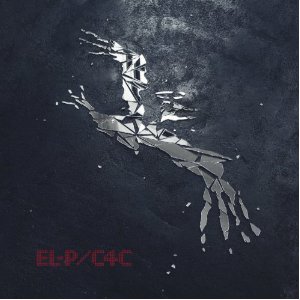You could quite easily misconstrue the tenacity of Brooklyn rapper El-P’s music as one man’s anger, but what’s probably most telling about his solo output to date is how intelligent he is with it. Ever since his days in Company Flow, one of the most vital underground rap groups around at the turn of the millennium, El’s been somewhat industrious, pouring noise, tension and a vicious edge into his drum heavy productions. And while it’s not really a new trick – that rap-over-an-awkward-jarring-backdrop is something Public Enemy’s production team the Bomb Squad coined and personified back in the 80s – he’s definitely pushed the envelope and progressed further than a heavy drone laced drum break, reversed police siren and looped sample. There was definitely a time in Co. Flow when that approach worked beautifully, but El-P’s production since, on albums like the seminal The Cold Vein by Cannibal Ox and on his latest work Cancer 4 Cure, is far deeper than that.
His first solo work Fantastic Damage was a biting statement of intent. In a post Company Flow independent rap landscape, his dense compositions like ‘Deep Space 9mm’ broke out of the expected hip hop templates and forever earned him the tag of the dystopian producer. I guess when you’re reading Phillip K Dick and are just as obsessed with Blade Runner and early New York hip hop, you can probably expect to make something that’ll split purist opinion. But what El-P’s constantly managed to do over his three albums proper, is push on past that and use his music to fully express himself. Using music as catharsis on early tracks like ‘Stepfather Factory’, he married his cutting outlook with cold, unforgiving beats, and throughout his career (‘The Overly Dramatic Truth’ and ‘Stay Down’) he’s continued to be a heavily personal rapper, able to make his melancholy seem universal.
Sonically C4C feels like the next step in El’s progression, a trail that you can actually follow back through his discography. Where the production work on Fantastic Damage eclipsed that of Company Flow’s seminal Funchrusher Plus, going for longer and revelling in a newfound depth and density, I’ll Sleep When You’re Dead, his second LP, went further than Fantastic Damage did. I don’t want to label the whole process as El ‘going prog’, but on it he definitely started to go further with his compositions, flexing his pectorals as a real hip-hop focused musician rather than a beatmaker. C4C embellishes that focus even more; the album opener ‘Request Denied’ is a sprawling, layered four-and-a-half minute jam where El only comes in at the three minute mark. Without undermining his work, and to completely overstate the obvious, compared with the instancy and straight El-P-ness of ‘The Full Retard’ that follows it, it’s clear that the opener’s structure and arrangement is made with performing with a full band in mind – something El did extensively on the ISWYD album.
The tracks leaked ahead of the album’s release, ‘The Full Retard’ and ‘Drones Over BKLYN’, are quite indicative of this new approach in general. The former came out swinging, realigning him with the squallingly infectious darkness of a lot of his previous standout tracks, whilst ‘Drones…’ also did that, but slipped a little bit of that compositional grandeur out there too, in its final minutes; just so, y’know, heads were really ready for El’s own brand of epic chord progressions.
But really, it’s tracks like ‘$4Vic’ and ‘The Jig Is Up’ that really scream out about the level of thought and the kind of emotion that’s behind the album. El’s always been a literal writer, using his music to clear his mind and speak on cultural issues (you’ll find him dressed as a prisoner being punished in the video for ‘Smithereens’). That’s something that’s been obvious from the very beginning, but what’s neat about C4C is that his stream of consciousness is a little more… followable.
Like pretty much all of his previous work, C4C isn’t really open for the casual listen. Music as densely layered and as assimilated as this tends to unwrap itself at different times in different situations and with varying results. ‘The Jig Is Up’ is basically an ode to El’s own paranoia, ‘Sign Here’ speaks on the art of interrogation and ‘For My Upstairs Neighbor’ is a fictional story that’s based on an overheard argument. It’s these types of things that inspire El-P to write, so it’s probably not surprising that his music sounds as partially mangled or as complex as it does. ‘Stay Down’ is built out of one constant bass note, shards of guitar feedback and heavy footed kick drums. Yep, it opens sounding as gnarled as that frank description suggests, but it turns itself inside out at the chorus with brass and piano riffs, making something disturbingly pretty out of something that really shouldn’t be. As an artist El-P’s always been really good at that – at finding the balance between abject horror and arresting beauty, like he’s repeatedly punching you in the face with a fist full of peonies.


